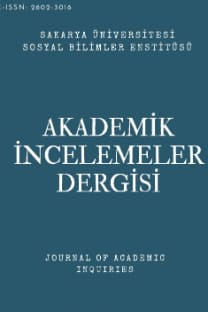ÜÇÜNCÜ DÜNYACILIĞIN YÜKSELİŞİ ve DÜŞÜŞÜ ÜZERİNE BİR TARİH YAZINI
İkinci Dünya Savaşı sonrası dünya Üçüncü Dünya halklarının uyanışına doğdu. Yüzyıllar boyunca “gelişmiş” Batı ülkelerinin hâkimiyetinde yaşamış halklar savaş sonrası silahsızlanma, barış, ekonomik adalet, gibi söylemlerle bezenmiş bir Üçüncü Dünya projesine yoğun ilgi gösterdiler. Bu makale Üçüncü Dünya projesinin tarih yazımını incelemektedir. Bu anlamda çalışma mevcut tarih yazımına toplumsal hareketler düzeyi, devletler düzeyi ve uluslararası düzey olmak üzere, üç düzeyde odaklanacaktır. Söz konusu üç düzeyde makale ilk olarak halkların dünyanın farklı coğrafyalarında verdiği mücadeleleri konu alacaktır. İkinci olarak, milliyetçi hükümetlerin anti-emperyalist mücadelelerini konu alan eserlere odaklanılacaktır. Son olarak ise, uluslararası düzeyde antiemperyalist ve anti-kolonyalist mücadele veren Bağlantısızlar Hareketi masaya yatırılacaktır.
Anahtar Kelimeler:
Üçüncü Dünya, Anti-Emperyalizm, Ulusal Kurtuluş Mücadeleleri, Bağlantısızlar Hareketi
On the Historiography of the Rise and Demise of the Third Worldism
After 1945, Western countries witnessed the awakening of the Third World. People of underdeveloped countries, who had been subjected to domination by developed Western countries, showed an interest towards a project of the Third World; the underlying motto of which was shaped by disarmament, peace, and social and economic justice. This project aimed to embody a radical break from the economic, political, social, and cultural paths which were devised in the West and then imposed on the rest of the world. This paper will analyze the historiography of this project. In this context, this paper will approach such literature from the lenses of social movements that emerged in the Third World, of nation states and of international relations. Through social movements, it will firstly focus on the people’s struggles in the different regions of the so-called Third World. Secondly, the paper will analyze academic works whose main subject is the anti-imperialist struggles of different nationalist governments. And lastly, it will criticize scholarly works on the Non-Alignment Movement, which pursued an anti-imperialist and anti-colonialist political agenda at the international level.
Keywords:
The National Liberation Struggles, The Third World, Anti-Imperialism, The Non-Alignment Movemen,
___
- Azimi, Fakhreddin. The Quest for Democracy in Iran: A Century of Struggle Against Authoritarian Rule. Cambridge: Harvard University Press, 2008.
- Azimi, Fakhreddin. “Unseating Mosaddeq: The Configuration and Role of Domestic Resources.” in Mark J. Gasiorowski and Malcolm Byrne editors, New York: Syracuse University Press, 2004.
- Bitar, Sergio. Chile: Experiment in Democracy. Philadelphia: Institute for the Study of Human Issues, 1986.
- Bryne, Malcolm. “Introduction.” in Mohammad Mosaddeq and the 1953 Coup in Iran editors Mark J. Gasiorowski and Malcolm Byrne, New York: Syracuse University Press, 2004.
- Bryne, Malcolm. “The Road to Intervention: Factors Influencing U.S. Policy Toward Iran, 1945-1953.” in Mark J. Gasiorowski and Malcolm Byrne editors, New York: Syracuse University Press, 2004.
- Chaliand. Gerard. Revolution in the Third World. London: Penguin Books, 1989.
- Dietz, Henry. “Revolutionary Organization in the Countryside: Peru.” in Revolution and the Political Change in the Third World, editors Barry M. Schutz and Robert O. Slater, Boulder: L. Rienner Publishers, 1990.
- Dirlik, Arif. The Postcolonial Aura: Third World Criticism in the Age of Global Capitalism. Oxford: Westview Press, 1997. Duiker, William J. Vietnam: Revolution in Transition. Boulder: Westview Press, 1995.
- Entelis, John. Algeria: The Revolution Institutionalized. Boulder: Westview Press, 1986.
- Foran, John. Taking Power: On the Origins of Third World Revolutions. Cambridge: Cambridge University Press, 2005.
- Gasirowski, Mark and Bryne, Malcolm editors. Mohammed Mosaddeq and the 1953 Coup in Iran. Syracuse: Syracuse University Press, 2004.
- Gott, Richard. Cuba: A New History. London: Yale University Press, 2004.
- Hecht, Lois. Politics in Chile: Democracy, Authoritarianism, and the Search for Development. Boulder: Westview Press, 1993.
- Heiss, Marry Ann. “The International Boycott of Iranian Oil and the Anti Mosaddeq Coup of 1953.” in Mark J. Gasiorowski and Malcolm Byrne editors, New York: Syracuse University Press, 2004.
- Katouzian, Homa. “Mosaddeq’s Government in Iranian History: Arbitrary Rule, Democracy, and the 1953 Coup.” in Mark J. Gasiorowski and Malcolm Byrne editors, New York: Syracuse University Press, 2004.
- Kim, Quee-Young editor. Revolutions in the Third World. Leiden: E. J. Brill, 1991.
- LeoGrande, William. “Central America.” in Revolution and the Political Change in the Third World, editors Barry M. Schutz and Robert O. Slater, Boulder: L. Rienner Publishers, 1990.
- Loomba, Annia. Colonialism/Postcolonialism. London and New York: Routledge, 1998.
- Moreno, Jose A. “Class, Dependency and Revolution in the Caribbean: Preliminary Considerations for a Comparative Study of Aborted and Successful Revolutions.” in Revolutions in the Third World, editor Quee-Young Kim, Leiden: E. J. Brill, 1991.
- Paige, Jeffrey. “The Social Origins of Dictatorship, Democracy and Socialist Revolution in Central America.” in Revolutions in the Third World, editor Quee-Young Kim, Leiden: E. J. Brill, 1991.
- Prashad, Vijay. The Darker Nations. New York: New Press, 2007.
- Schutz, Barry M. and Slater, Robert O. editors. Revolution and the Political Change in the Third World. Boulder: L. Rienner Publishers, 1990.
- Singham, A. W. and Hune, Shirley. Non-Alignment in an Age of Alignments. Connecticut: Third World Books, 1986
- Yayın Aralığı: Yılda 2 Sayı
- Başlangıç: 2006
- Yayıncı: Sakarya Üniversitesi Sosyal Bilimler Enstitüsü
Sayıdaki Diğer Makaleler
TÜRKİYE’DE PROTOKOL EĞİTİMİ’NİN YETERSİZLİĞİ
KIRIK BİR KALP HİKÂYESİ: OSMAN FAHRİ ŞİİRİNDE KAYIP NESNE
Bir ve Çok Âmirî Felsefesinde Tanrı ve Âlem
ULUS-AŞIRI DEMOKRASİNİN YÜKSELİŞİ VE ULUSLARARASI HUKUK SİSTEMİNE ETKİLERİ
SEYYAHLARIN ANLATIMI İLE OSMANLI’NIN SON 30 YILINDAKİ ESKİŞEHİR (1892-1922)
AHMET HAMDİ TANPINAR’IN BURSA’DA ZAMAN ŞİİRİNDE ZAMAN VE MEKÂN ALGISI
TÜRKÜN İŞ ZİHNİYETİ ÜZERİNE BİR DENEME
GEÇİRGEN SINIRLAR: MARDİN’DE ETNİK-DİNİ GRUPLAR ARASINDA SANAL AKRABALIK BAĞLARI
2015 TÜRKİYE PARLAMENTO SEÇİMLERİ IŞIĞINDA CHP'NİN OYLARINI ARTIRAMAMASININ NEDENLERİ
